-
today's events
Gallery and Bookshop Hours Chicago Architecture Biennial Jan 01, 2026 - Feb 28, 2026
-
upcoming event
-
past events
End-of-year Bookshop Sale Dec 13, 2025 - Dec 20, 2025
Eve Aboulkheir Lampo Performance Series Dec 06, 2025 Performance
Leila Bordreuil and Lee Ranaldo Lampo Performance Series Nov 08, 2025
Roc Jiménez de Cisneros Lampo Performance Series Oct 11, 2025
Concepción Huerta Lampo Performance Series Sep 27, 2025 Performance
Madlener House
4 West Burton Place
Chicago, Illinois 60610
Telephone: 312.787.4071
info@grahamfoundation.org
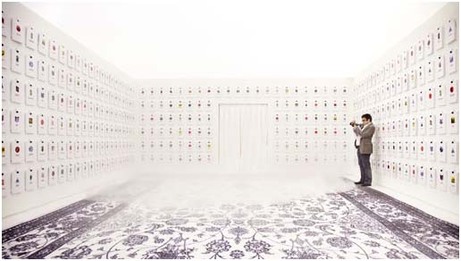
"Future on Pause," 2010 © Luis Urculo
Madrid-based architect Luis Urculo will discuss his recent work. This talk is presented in partnership with Mas Context.
Luis Urculo's work is characterized by an unusual portrayal of architecture in the form of illustrations, animations, installations, and interiors. He studied at the ETSAM Madrid, at the Illinois Institute of Technology Chicago and at the Institute of Design and has collaborated with Alberto Campo Baeza, Mansilla-Tuñon and Izaskun Chinchilla. In 2006, he opened his own studio developing ephemeral architecture projects, stage designs and video-installations for Conde Nást, Philippe Starck and Sybilla, among others. His work has been exhibited at the XI Bienale di Architettura di Venezia, Montevideo Bienial, COAM Foundation and other locations. He also works as a teacher with Jaime Hayón for Master of European Design Labs at Instituto Europeo di Design, Madrid.
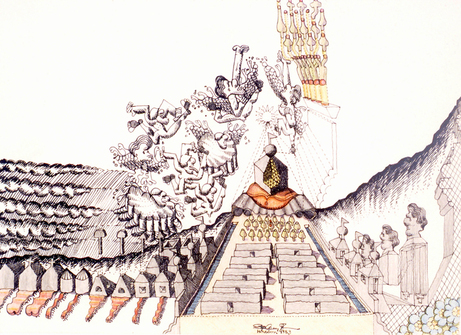
Stanley Tigerman, Architoon - Houston, 1983.
Join us for an opening reception with Stanley Tigerman and exhibition curator Emmanuel Petit.
5PM Lecture by Emmanuel Petit: "Scaffolds of Heaven: on Tigerman"
NOTE: RSVPS for Emmanuel Petit's Lecture are at capacity. To join the wait list, please click HERE. Unused reservations will be released to members of the wait list promptly at 5PM. Please join us for the opening reception from 6-8PM.
6-8PM Opening Reception
To RSVP to the opening reception, click HERE.
For more information on the exhibition, Ceci nʻest pas une rêverie: The Architecture of Stanley Tigerman, click here.
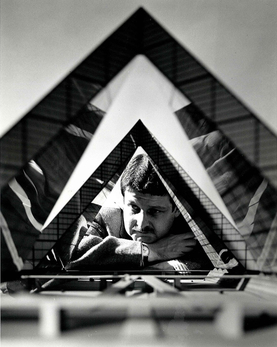
Stanley Tigerman, Instant City Model, 1966. Photo Balthazar Korab.
Stanley Tigerman will give a talk at the Graham Foundation in conjunction with the exhibition on his work, Ceci n'est pas une rêverie: The Architecture of Stanley Tigerman.
A Chicago native and principal in the architectural and design firm of Tigerman McCurry, Stanley Tigerman (b. 1930) has undertaken nearly 400 projects, resulting in more than 175 built works. Tigerman trained in some of Chicago’s top firms from 1949 until 1959 including the office of Keck & Keck, Milton Schwartz, and Skidmore, Owings & Merrill. Following his graduation from Yale University, where he received both his BArch (1960) and MArch (1961) under the leadership of Paul Rudolph, Tigerman established his own firm, working with several partners, before founding Tigerman McCurry Architects in 1986 with his wife Margaret McCurry. Tigerman is the author of seven books including The Chicago Tribune Tower Competition and Late Entries (1980); Versus: An American Architect’s Alternatives (1982); The California Condition: A Pregnant Architecture (1982); The Architecture of Exile (1988); Stanley Tigerman: Buildings and Projects 1966-1989 (1989); Schlepping through Ambivalence (2011); his autobiography Designing Bridges to Burn (2011), and he has edited numerous others. In addition to being chosen as was one of the architects to represent the United States at the 1976 and 1980 Venice Biennales, the work of Tigerman’s firm has been exhibited in major galleries and art museums around the world, including the Art Institute of Chicago, the Metropolitan Museum, and the Museum of Modern Art in New York.
In addition to his own work, Tigerman has demonstrated an unwavering commitment to advancing the discussion of architecture in Chicago for more than five decades. During this time he was a founding member of the critically engaged group The Chicago Seven; he was the director of the School of Architecture at the University of Illinois at Chicago between 1985 and 1993; and he co-founded ARCHEWORKS, a school and “socially oriented design laboratory” with Eva Maddox in 1994. Most recently, Tigerman co-curated the Graham funded exhibition Design on the Edge: Chicago Architects Reimagine Neighborhoods at the Chicago Architecture Foundation, featuring transit projects commissioned by the city’s top young design talent, and dedicated to the city’s new mayor Rahm Emanuel.
For more information on the exhibition, Ceci nʻest pas une rêverie: The Architecture of Stanley Tigerman, click here.
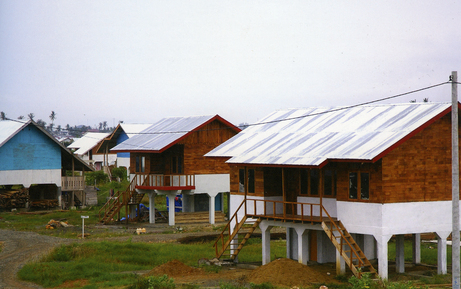
New stilt houses in the village of Lam Isek. Image courtesy of Adrea Fitrianto.
Around the globe, groundbreaking work is being done by small teams of outstanding professionals who are helping people recover from disaster and rebuild homes, infrastructure, and communities, and bridging the gap that separates short-term emergency needs from long-term sustainable recovery. On February 22, Paris based Marie Aquilino will discuss her new book Beyond Shelter: Architecture and Human Dignity. The book features 25 reports from the field by leaders of architecture, engineering firms, non-profits, research centers, and international agencies that are working to provide disaster prevention and sustainable recovery efforts in a wide range of urban and rural locales, including Manila, New Orleans, Gujarat, São Paulo, Sudan, Vietnam, Kashmir, Sierra Leone, Kansas, and Haiti.
Marie J. Aquilino is a professor of architectural history at the École Spéciale d'Architecture (ESA) in Paris and a specialist in contemporary urban redevelopment. At the ESA she is creating a program to train architecture students to work in contexts of extreme need and crisis in the developing world. In addition, she serves as associate program director of the BaSiC Initiative; is collaborating with the International Federation of the Red Cross to set up a working group on the reconstruction of Haiti; and is a founding partner in OpenJapan, a worldwide design collaborative that devises integrated systems of risk mitigation.
Following the talk, copies of Beyond Shelter will be available for purchase. A book signing and reception will be held in the library.
This event is co-sponsored by Archeworks and by the National Public Housing Museum.
Beyond Shelter at D.A.P. books
http://www.artbook.com/9781935202479.html
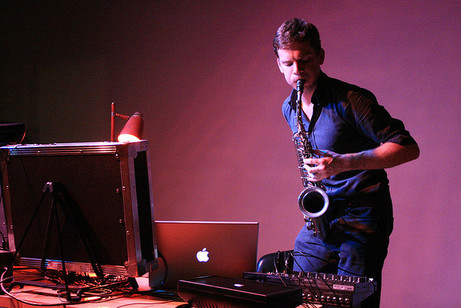
Photo: Angeline Evans
Lampo and the Graham Foundation are pleased to welcome Thomas Ankersmit as he presents new work created for the Serge analogue modular synthesizer, an instrument developed by Serge Tcherepnin at CalArts in the 1970s. Ankersmit will play his own Serge modular live, mixing with pre-recorded material that he created with the original Serge synthesizers at CalArts, where he has been an artist in residence since December 2011. The performance will be processed in real-time in quad.
Thomas Ankersmit (b. 1979, Leiden, the Netherlands) is a musician and installation artist based in Berlin and Amsterdam. His main instruments are the Serge analogue modular synthesizer, computer and alto saxophone. He frequently works with New York minimalist Phill Niblock and electroacoustic artists Valerio Tricoli and Kevin Drumm. Ankersmit last performed at Lampo in September 2008, when he presented a solo concert for alto sax, Serge synthesizer and computer.
This performance is presented in partnership with Lampo. Founded in 1997, Lampo is a non-profit organization for experimental music, sound art and intermedia projects.
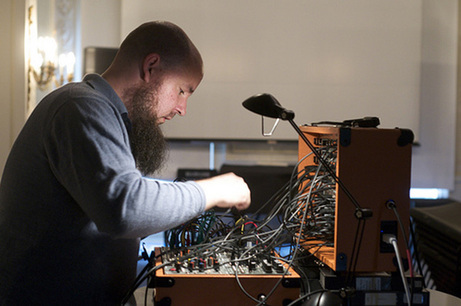
Lampo and the Graham Foundation are pleased to present Keith Fullerton Whitman as he performs the US premiere of Rhythmes Naturels in a 4-channel mix. Whitman composed the work at the legendary INA-GRM studios in Paris, which was founded in the late fifties to encourage the development of electronic music. While in residence, he was commissioned to develop a new piece for the Acousmonium, an 80-speaker sound system designed by former INA-GRM member François Bayle. Whitman drew additional inspiration from other well known members of the midcentury studio collective including founder Pierre Schaeffer, Luc Ferrari, Iannis Xenakis, and Bernard Parmegiani. Whitman will also perform a live modular synthesizer improvisation.
Keith Fullerton Whitman (b. 1973, Bergen County, N.J.) is a composer and performer fascinated by electronic music from its mid-century origins in Europe to its contemporary worldwide incarnation as digital music. He has recorded albums influenced by many genres including ambient music, drone, drill and bass, musique concrète and krautrock. Whitman has recorded and performed using several aliases, of which the most familiar is Hrvatski. Whitman lives in Cambridge, Massachusetts.
This performance is presented in partnership with Lampo. Founded in 1997, Lampo is a non-profit organization for experimental music, sound art and intermedia projects.
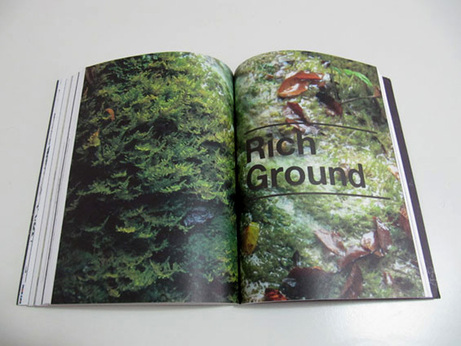
Image: Damian Holmes
The Graham Foundation is pleased to present the premier launch of the Graham grantee project Dirt (MIT Press, 2012) and a talk by Megan Born, who co-edited the book along with Lily Jencks and Helene Furján. Dirt presents a selection of works that share dirty attitudes: essays, interviews, excavations, and projects that view dirt not as filth but as a medium, a metaphor, a material, a process, a design tool, a narrative, a system. Rooted in the landscape architect's perspective, Dirt views dirt not as repulsive but endlessly giving, fertile, adaptive, and able to accommodate difference while maintaining cohesion. This dirty perspective sheds light on social connections, working processes, imaginative ideas, physical substrates, and urban networks.
Dirt is the latest installment from the student-edited and student-managed publication entity viaPublications, a collaborative of interdisciplinary students, professors, and professionals, founded by graduate students at the University of Pennsylvania School of Design.
Helene Furján is the series editor and faculty advisor for viaBooks. Contributors to Dirt include Barry Bergdoll, Alan Berger, Anita Berrizbeitia, Megan Born, William Braham, Lindsay Bremner, Kim Brickley, Case Brown, Mark Campbell, James Corner, Phillip Crosby, Keller Easterling, Ruth Erickson, Larissa Fassler, Annette Fiero, Future Cities Lab, Andrea Hansen, Mark Alan Hughes, Tetsugo Hyakutake, Robert Le Ricolais, Lily Jencks, Peter Lloyd Jones, Keith Kaseman, Ferda Kolatan, John Landis, Sylvia Lavin, Andrew Lucia, Ian McHarg, Frank Matero, PEG Office of Landscape + Architecture, Rhett Russo, SERVO, Cathrine Veikos, Phoebe Washburn, Marion Weiss, and Richard Wesley.
Megan Born is a landscape and architectural designer at James Corner Field Operations in New York, a lecturer at the Yale School of Architecture and a graduate of PennDesign (M.Arch/MLA, 2008).
Following the talk, copies of Dirt will be available for purchase. A book signing and reception will be held in the library.
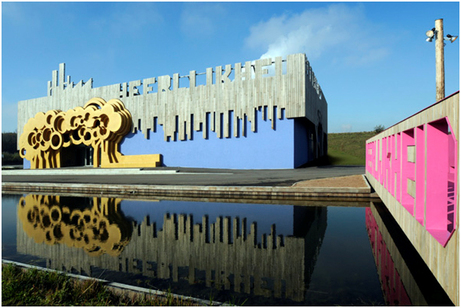
FAT, the Villa, Hoogvliet, the Netherlands, 2008 © Maarten Laupman.
While grand visions are often considered the currency of contemporary architecture, the truth is that compromise—rather, the uncomfortable sensation of being compromised—is the natural state of the architect, and the condition under which architecture is made. For architecture, context is never pure or abstract; it is a site physically, economically, and socially inscribed by competing interests. These compromised positions and scoured surfaces are where architecture’s political and ideological subtexts are revealed. Yet from these cloudy waters, the most innovative, relevant, and unexpected forms can emerge.
Sam Jacob (FAT), Liza Fior (muf), and Damon Rich of Newark will reveal their own complicities and compromises, and discuss how these conditions can become grounds for creative and engaged forms of architecture and urban planning.
Graham grantee Sam Jacob is a director of London-based architecture office FAT, where he has been responsible for award-winning projects in the UK and abroad, such as the Heerlijkheid Hoogvliet (NL), Islington Square(UK), and Sint Lucas Art Academy (NL). Current projects include the BBC Drama Production Village in Cardiff, and CIAC, an 80-unit housing scheme in Northern England. As part of FAT, Jacob has received several awards, including the RIBA European Award (in 2009 and 2007), the Architecture Foundation Next Generation Award (2007), and the FX Award (Best Museum, 2007; Best Public Project, 2005). Jacob has taught and lectured at universities internationally. He is currently professor of architecture at the University of Illinois at Chicago, and unit master at the Architectural Association, London; previously, he has taught at the Yale School of Architecture. Jacob is codirector of the Architectural Doppelgangers Research Cluster at the AA, a design critic for Art Review, and contributing editor to Icon. With Charles Jencks, Sean Griffiths, and Charles Holland, he coedited the recent AD issue Radical Post Modernism. Jacob also writes and edits strangeharvest.com, and contributes to a variety of publications.
Liza Fior was born in London, UK, where she continues to practice as a founding partner of muf architecture/art. Muf negotiates between built and social fabrics, public and private interests, through projects that have been largely, but non-exclusively, focused in East London. These projects range from urban-design schemes to small-scale temporary interventions, from landscapes to buildings—each part of a continual dialogue. Muf's approach—value what’s there, nurture what's possible, and define what’s missing—is currently demonstrated by Making Space in Dalston, which will extend into a series of projects around the fringe of London’s Olympic site. At the 2010 Venice Architecture Biennale, muf turned the British Pavilion into a platform for locally based concerns. Muf's awards include the 2008 European Prize for Public Space (a UK first), for Barking, East London's new "town square." In addition, Fior is coauthor of This is What We Do: A Muf Manual.
Graham grantee Damon Rich is a designer and artist. In exhibitions, graphic works, and events, sometimes produced in collaboration with young people and community-based organizations, Rich creates fantastical spaces for imagining the physical and social transformation of the world. His work represented the United States at the 2008 Venice Architecture Biennale, and has been exhibited at PS 1 Contemporary Art Center, Storefront for Art and Architecture, the Canadian Centre for Architecture, and the Netherlands Architecture Institute. In 1997, he founded the Center for Urban Pedagogy (CUP), a nonprofit organization working to increase the impact of public participation in planning and development, where he served as creative director for ten years. Rich has taught architecture and planning courses at the Cooper Union, Syracuse University, Pratt Institute, and the Parsons School of Design, and has written about architecture and politics for publications including Perspecta, the Nation, Domus, and Architecture. He currently serves as urban designer for the City of Newark, New Jersey, where he leads design efforts with public and private players to improve the city’s public spaces.
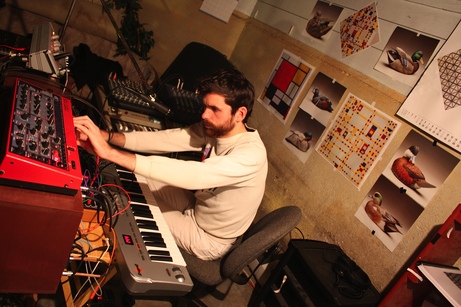
Lampo and the Graham Foundation are pleased to present Matt Carlson in his Chicago debut. Carlson, a member of the duo Golden Retriever and former member of the Parenthetical Girls, will premiere new compositions for analog modular and digital synthasizers and voice with an array of time-lag devices and effects. Here, he promises a burbling landscape punctuated with tweaked percussives and schizophrenic FM drops. The performance will be Carlson’s first four channel work.
Matt Carlson (b. 1983, Seattle) is a composer and musician, and an active participant in Portland’s underground and experimental music scene. In his recent music, he uses his body and voice to interact with a large analog modular synthesizer, conjuring dense clouds of sound. Current collaborations include modal electro-acoustic compositions and improv with bass clarinetist Jonathan Sielaff as Golden Retriever, and sound installations, videos and performances in Oregon Painting Society, a five-person Portland artist collective. He has released a number of solo recordings, including the well-received LP “Particle Language” (Draft) and cassette “Gecko Dream Levels” (Gift Tapes). He has performed at the Tate Modern in London, Barcelona's Primavera Sound festival, Seattle's Bumbershoot festival and in Portland's Time-Based Art festival. Carlson studied composition and electronic music at Cornish College of the Arts in Seattle.
This performance is presented in partnership with Lampo. Founded in 1997, Lampo is a non-profit organization for experimental music, sound art and intermedia projects.
Please note: Seating will be first come first served. Doors will open at 7:30PM.
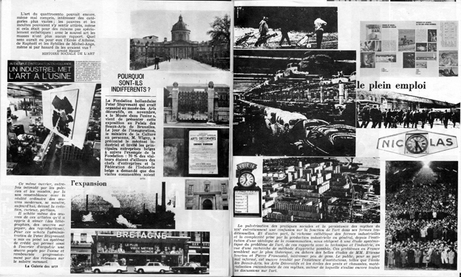
Image: from Utopie: Texts and Projects 1967–1978 (Semiotext(e)and MIT Press, 2011).
Starting from the recent anthology of writings, Utopie: Texts and Projects 1967–1978 (Semiotext(e) and MIT Press, 2011), Buckley’s talk will focus on the production of the Utopie group, a collection of architects, urbanists, and sociologists that emerged in the cracks between several disciplines in the late 1960s. While the group’s collaboration is often seen as parallel to the simultaneous rise of interdisciplinarity within the academy and in large urban planning initiatives, for Utopie such a collaboration remained distinct from, and opposed to these larger institutional trends. The talk will reexamine the demands that such group formations placed upon the intellectual and pedagogical culture of architecture during the late 1960s in order to consider what its legacies may be today.
The talk will be followed by an open discussion moderated by Sara Knox Hunter of Summer Forum for Inquiry and Exchange. Conversation will then continue with a reception in the library and Graham bookshop where Utopie: Texts and Projects 1967–1978 and other related titles will be available for sale.
Craig Buckley teaches at Columbia University’s Graduate School of Architecture, Planning, and Preservation, where he is also the Director of Publications. His research focuses upon relationships between architectural practice, new genres of publication, and politics in the postwar period. Recent books include Dan Graham’s New Jersey (coedited with Mark Wasiuta, Lars Müller Publishers, 2012), Utopie: Texts and Projects 1967-1978 (with Jean-Louis Violeau, Semiotext(e) 2011) and Clip/Stamp/Fold: The Radical Architecture of Little Magazines 196X-197X (with Beatriz Colomina, ACTAR Press 2010). His writing and criticism have appeared in the journals Anarchitekur, Log, October, and Perspecta, among others.
This event is co-sponsored by the Graham Foundation and Summer Forum for Inquiry and Exchange.
Summer Forum for Inquiry and Exchange seeks to nurture and facilitate conversation and creative exploration through an examination of contemporary texts. This year, participants will meet in New Harmony, Indiana for a one-week summer residency to engage in an extended dialogue centered on directed readings on the prescribed theme, "Community, Utopia, and the Individual."
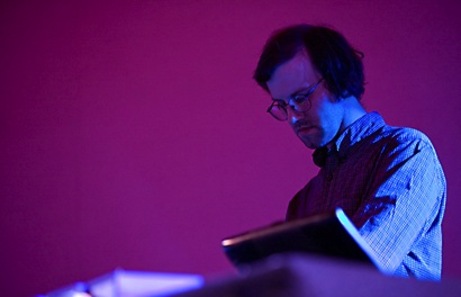
Photo: Giovanni de Angellis
In his Lampo debut, John Wiese will present three new works — a quad diffusion of "Magical Crystal Blah," an all-new iteration of "Battery Instruments," and a concrète improvisation. Expect an immersive sonic experience, shaped by John's distinctive and precise use of stereo panning.
John Wiese (b. 1977, Ft. Leavenworth, KS) works primarily in recorded and performed sound with a focus on installation and multi-channel diffusions, as well as scoring for large ensembles. Wiese is involved in multiple ongoing projects including the concrète grindcore band Sissy Spacek, and collaborations with Evan Parker, C. Spencer Yeh, Aaron Dilloway, Kevin Drumm, Lasse Marhaug, and others. In 2011 he released his 100th 7-inch record, celebrated with a retrospective exhibit and monograph. Many of these recordings were published on his Helicopter label, and on more than 50 independent labels from around the world. Wiese has toured extensively and has appeared at several leading international festivals. He lives and works in Los Angeles.
This performance is presented in partnership with Lampo. Founded in 1997, Lampo is a non-profit organization for experimental music, sound art and intermedia projects.
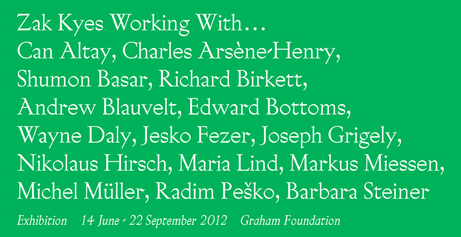
Radim Peško, “Dear Sir, Dear Madam,” typeface, 2011.
'Zak Kyes Working With…' will open with a public reception June 14, 2012. Please join us for a talk by Zak Kyes at 5:30PM, followed by an opening reception and the world premiere book launch of the exhibition catalog published by Sternberg Press from 6-8PM.
For more information on the exhibition, Zak Kyes Working With..., click here.
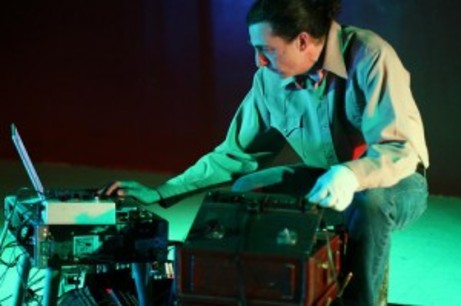
Los Angeles musician Joseph Hammer returns to Lampo this month in a follow up to his 2007 performance of “Road Less Traveled.” Hammer (b. 1959, Hollywood, CA) has performed widely and contributed to the Los Angeles underground music community since the early 1980s. Notably, Hammer participated in the Los Angeles Free Music Society (LAFMS), a loose collective of LA-based experimental musicians active through the 1970s and 1980s, and co-founded groups Points of Friction, Dinosaurs with Horns, and the trio Solid Eye. His practice draws on the complexities of the process of listening and playing, using music as it influences our notions of time, memory and intimacy as the basis for improvisation and abstraction.
Wearing white cotton gloves, Hammer physically manipulates computerized sources that have been abstracted as tape loops on vintage magnetic audio gear, a high fidelity, full-track mono analog tape recorder serving as his primary instrument. He uses a series of real-time mechanical interventions to transform and layer the source material, physically manipulating the degree of exposure of the tape loops and creating varying strata of old and new information on the loop of magnetic tape.
For this Lampo performance, the artist will premiere “Dynasty III,” the latest installment in his “Dynasty Suite” series, drawing widely-collaged source material from songs that make the artist cry. Come for the gorgeous plunderphonics; stay for a megadose of the lachrymose.
This performance is presented in partnership with Lampo. Founded in 1997, Lampo is a non-profit organization for experimental music, sound art and intermedia projects.
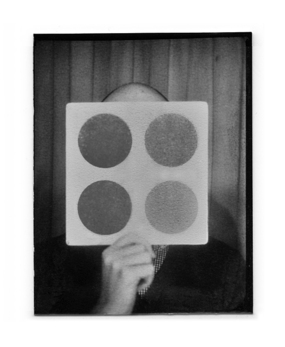
James Goggin, Passport Photo Colour Test, Rainbo Club, Chicago, November 30, 2011
Goggin will explore the evolving definition of and possibilities for identity in graphic design, from an ongoing questioning of cultural identity since his peripatetic childhood, to a current interest in institutional identity with his work in progress at the Museum of Contemporary Art Chicago. An argument for identity as a critical and speculative platform will be made with illustrated case studies in contemporary art and architecture from his design practice in the UK and the Netherlands, alongside current design and publishing at MCA Chicago and a recent exhibition project in France involving an identity which questions the very need for identities.
James Goggin founded graphic design studio Practise in 1999 upon graduation from London’s Royal College of Art. After 10 years in London, the studio moved to Arnhem, the Netherlands, where he combined commissioned projects with teaching at postgraduate design school Werkplaats Typografie, alongside monthly lecturing in history and theory at ECAL (University of Art and Design Lausanne), Switzerland. In August 2010, James took up the Director of Design, Publishing, and New Media position at the Museum of Contemporary Art in Chicago, where he now lives and works.
Previous clients include Camden Arts Centre, David Kohn Architects, Frieze, Phaidon, Tate Modern, Transport for London, and Victoria & Albert Museum. James lectures, runs workshops, and is a visiting critic at various art institutions and design schools in Europe, Australasia, and the United States, and regularly writes for international publications and journals. Typefaces designed by James are distributed by Swiss type foundry Lineto.
For more information on the exhibition, Zak Kyes Working With..., click here.
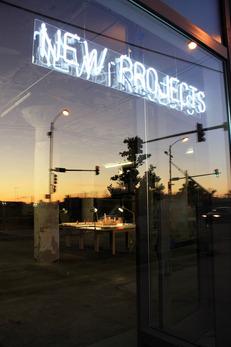
Please join us for an informal presentation and discussion in conjunction with our five-week Summer Seminar, Breaking Glass, by guest presenters Stephanie Smith and Marshal Brown, who are together the directors of the urbanism, art and culture think tank NEW PROJECTS. The talk will be followed by an open discussion with the seminar participants and visitors.
NEW PROJECTS is an urbanism studio, research center, and exhibition space in Chicago. The 3400 square foot storefront is a new center for instigating, nurturing, and realizing advanced thinking in architecture, urban design and aesthetic culture. The storefront office is located in the former home of the Overton Hygienic Company, an African American cosmetics concern from the 1920's. Other local landmarks include Ludwig Mies van der Rohe's IIT campus and the former site of Stateway Gardens, one of Chicago's recently demolished public housing projects.
Stephanie Smith is Deputy Director and Chief Curator at the University of Chicago¹s Smart Museum of Art. Since joining the Smart Museum as Associate Curator in 1999, she has played a central role in establishing the museum¹s reputation as a home for challenging thematic exhibitions that address the complex relationships between contemporary art and larger social issues and for projects that combine rigor, generosity, and play. For her work on projects such as Feast: Radical Hospitality in Contemporary Art (2012); Heartland (2008-2009), and Beyond Green: Toward a Sustainable Art (2005), she has been recognized as one of the most visionary curators working in Chicago. Smith also serves as a founding member of the University's Open Practice Committee and as an editor with the international art journal Afterall.
Marshall Brown is a licensed architect and urban designer in Chicago who creates ambitious, entrepreneurial visions for the future. His recent accomplishments include competing as a finalist in the Navy Pier redevelopment competition, a 2010 MacDowell Fellowship, and serving as the first Cranbrook Saarinen Architecture Fellow. In 2003 he founded the Yards Development Workshop, a studio that set out to hi-jack Frank Gehry’s Atlantic Yards project in Brooklyn. He also recently founded the urbanism, art and culture think tank NEW PROJECTS in collaboration with Stephanie Smith. He has worked with a diversity of organizations including New York City Council, U.S. Department of Energy, Port Authority of New York & New Jersey, Municipal Art Society of New York, and the Smithsonian Institute. Brown is also an Assistant Professor at the Illinois Institute of Technology College of Architecture. He previously taught at the University of Cincinnati and is on the editorial board of the Journal of Architectural Education. Brown has lectured at the Chicago Humanities Festival, University of Michigan, Northeastern University, and Cranbrook. His projects and essays have appeared in several books and journals, including Architectural Record, The New York Daily News, The Believer, and New Directions in Sustainable Design. His practice, Marshall Brown Projects, Inc. is currently working on several projects in Chicago, including the Navy Pier redevelopment with James Corner Field Operations, a master plan for the neighborhood of Washington Park, and scenario planning for the University of Chicago Smart Museum of Art.
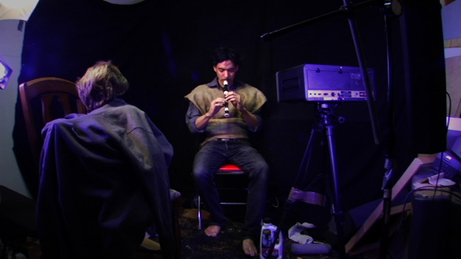
"Victor School" 2011, Digital Video, 6 minutes, courtesy Ronnie Bass.
As part of the Graham Foundation Breaking Glass seminar, Ronnie Bass, Daniel Bauer, and Irena Knezevic will discuss the increasing prevalence of the movie projector used as a functioning object in the gallery space. Artists such as Rodney Graham and Tacita Dean have placed the projector at the center of their practice and others such as Sharon Lockhart and Blake Rayne have used the projector alongside photographs and paintings.
Through the presentation of Bass’ work we will analyze the projection of clocktime and alternative chronotopes as a foil to the fetish of the cinematic apparatus.
Suggested readings for the discussion include:
Giorgio Agamben; "Difference and Repetition: on Guy Debord’s Films", in Tom
McDonough ed., Guy Debord and the Situationist International, MIT Press, 2002
Boris Groys, “Comrades of Time”, Eflux Journal #11 December 2009.
Tom Gunning, "Animated Pictures: Tales of Cinema's Forgotten Future" Michigan Quarterly Review, Fall 1995
Jonathan Crary, “Spectacle, Attention, Counter-Memory” October, Vol. 50 (Autumn, 1989), pp. 96-107
Daniel Bauer holds a BFA from Bezalel Academy of Art and Design, Jerusalem (1998) and an MFA from Columbia University, NY (2008). Exhibitions: Kunst Werke, Berlin; Malmo Konsthaal; Witte de With, Rotterdam; Israel Museum, Jerusalem; Storefront for Art and Architecture, NY; Tokyo Wonder Site; Andrea Meislin Gallery, NY. Bibliography: The Power of Inclusive Exclusion; Hollow Land; Civilian Occupation; BORDERLINEDISORDER; Studio Magazine; Mute; Metropolis; Landscapes Abused, Institut Fur Landschaftscarchitektur; Frieze; AI-AP DART; Artforum; New York Magazine. Collections: Israel Museum Jerusalem. Awards: Gerald Levy Prize for Young Photographers.
Ronnie Bass (b. 1976, Hurst, Texas) is a New York-based visual artist and musician. He received an MFA from Columbia University. He works within video, sculpture, performance and sound. Bass has exhibited nationally and internationally at museums and galleries including Anthology Film Archives, MoMA P.S.1, the New Museum of Contemporary Art, Performa07, the Kitchen, and James Cohen Gallery; all New York, ICA; Philadelphia, Portland Institute for Contemporary Art, Henry Art Gallery; Seattle, Transmission Gallery; Glasgow, The Building (e-flux); Berlin, and Centro de Arte de Sevilla among others. Musical compositions include the score for Rirkrit Tiravanija’s Guggenheim prize exhibition, Tomorrow Is Another Fine Day, Serpentine Gallery; London. Bass teaches digital art at New York University. He is currently working on his forthcoming book, Survival Journal.
Irena (Ika) Knezevic works in various visual art formats, music, and architecture. Her current research spans exhibition design, second- and third-base superarchitecture, institutional zombification, and paradoxes within post-socialist transitional states. Knezevic's work has been exhibited and performed Museum of Contemporary Art, Chicago; Harvard University, Cambridge; Jan Van Eyck Academie, Mastricht; Control Room, Los Angeles; Institute for Contemporary Art, Philadelphia; 4th Athens Biennale, Museum of Arts and Design, New York; Logan Center Exhibitions, University of Chicago; and AKUD, Berlin. She is currently visiting artist in the Department of Art Theory and Practice at Northwestern University.
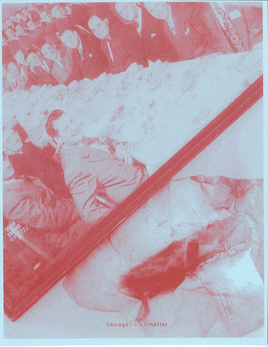
On August 11th, the Graham Foundation hosted Chicago Matter, a one-day workshop organized by Tim Parsons and Michael Savona as an extension of the Zak Kyes Working With... exhibition. Referencing the format of Zak Kyes' and Can Altay's workshop, Leipzig Papers, conducted during the first showing of the exhibition at the Museum of Contemporary Art Leipzig, this workshop took meaningful objects from Chicago as its starting point.
Tables designed by Can Altay provided the setting for a group discussion and working session about various modes of independent publishing and distribution. The participants' objects and experiences were then translated into two dimensions by a variety of means using a Risograph RP3700 duplicator to form a new publication entitled Chicago Matter.
Pages from the publication will be displayed throughout the duration of the Zak Kyes Working With... exhibition. Printed in a limited edition of 150, the publication will be distributed nationally and internationally. A limited number of copies will be available for sale at the Graham Foundation bookshop while supplies last.
For more information on the exhibition, Zak Kyes Working With..., click here.
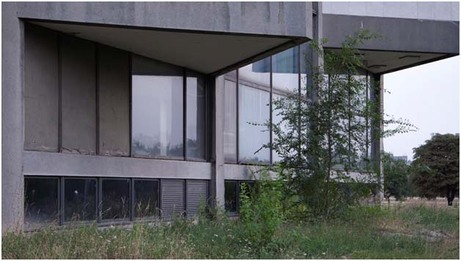
Irena Knezevic, Small Film About Architecture, 2012.
Join us for a series of talks and a conversation with graphic designer Jörg Becker, artist Irena Knezevic, and architect Jimenez Lai as we mark the last day of the five-week Breaking Glass seminar.
Jörg Becker: if. iffer. the iffest.
Irena Knezevic: World Without Art
Jimenez Lai: Sensibility vs. Convention in Graphics
Jörg Becker is a German Typographer and(!) non-Expert. He is an Assistant Professor at University of Illinois at Chicago. Before graduating with a Master of Design at Post St Joost Academy in Breda (Netherlands), Becker communicated for the German Government and its Ministries, several German Artists (e.g Hans-Jürgen Breuste), Cultural operators (e.g. Kestner Gesellschaft). Becker presented his thoughts about the "do's and do's" of creativity and decidability at the "typo Berlin", Germany; North Carolina State University, Raleigh; Washington University, St Louis; TypeCon, Atlanta; Otis College of Art and Design (visiting Artist), Los Angeles. His writing has been published in Blast Counterblast, published by Mercer Union and WhiteWalls; International Conference on New Directions in the Humanities, Universidad de Granada (Spain).
Irena (Ika) Knezevic works in various visual art formats, music, and architecture. Her current research spans exhibition design, second- and third-base superarchitecture, institutional zombification, and paradoxes within post-socialist transitional states. Knezevic's work has been exhibited and performed Museum of Contemporary Art, Chicago; Harvard University, Cambridge; Jan Van Eyck Academie, Mastricht; Control Room, Los Angeles; Institute for Contemporary Art, Philadelphia; 4th Athens Biennale, Museum of Arts and Design, New York; Logan Center Exhibitions, University of Chicago; and AKUD, Berlin. She is currently visiting artist in the Department of Art Theory and Practice at Northwestern University.
Jimenez Lai is an Assistant Professor at University of Illinois at Chicago and Leader of Bureau Spectacular. He graduated with a Master of Architecture from University of Toronto. Previously, Jimenez Lai has lived and worked in a desert shelter at Taliesin and resided in a shipping container at Atelier Van Lieshout on the piers of Rotterdam. Before founding Bureau Spectacular, Lai worked for MOS, AVL, REX, and OMA/Rem Koolhaas in Toronto, Rotterdam, and New York. In the past years, Lai has built numerous installations as well as being widely exhibited and published around the world. His first manifesto, Citizens of No Place, was published by Princeton Architectural Press with a grant from the Graham Foundation. Draft II of this book has been archived at the New Museum as a part of the show Younger Than Jesus. In 2012, Jimenez Lai has been named a winner to the Architectural League Prize for Young Architects.
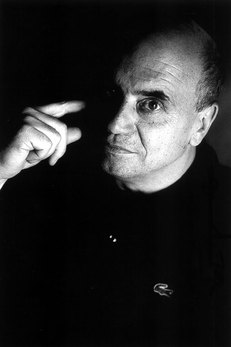
Renowned architect and former director of the Venice Architecture Biennale, Massimiliano Fuksas will discuss his major public and cultural buildings, including recently finished and new projects under construction.
Massimiliano Fuksas (born 1944, Lithuania) graduated from La Sapienza University in Rome with a degree in architecture in 1969. He set up his first studio in Rome in 1967, added a second in Paris in 1989, and a third in Shenzhen, China in 2008. From 1998 to 2000 he was director of the VII International Architecture Exhibition in Venice: Less Aesthetics, More Ethics. Fuksas has been a visiting professor at several universities, including the École Spéciale d’Architecture in Paris, the Akademie der Bildenden Kunste in Vienna, the Staadtliche Akademie des Bildenden Kunste in Stoccarda, and Columbia University in New York. He is the author of the architectural column founded by Bruno Zevi in the weekly magazine L’Espresso. Fuksas currently lives and works in Rome and Paris.
This event is co-presented by the Graham Foundation and the Italian Cultural Institute of Chicago.
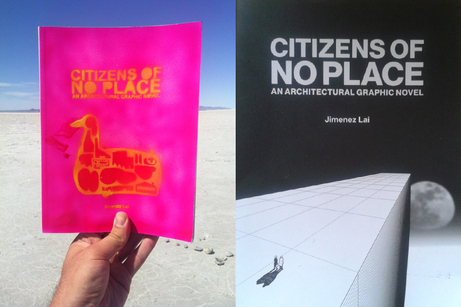
Please join us for a book launch and quasi-reading with Jimenez Lai to celebrate the publication of his new book Citizens of No Place. A manifesto, the book is an homage to other architects who drew, imagined, and told stories. Citizens of No Place was supported with a grant from the Graham Foundation and was published by Princeton Architectural Press. Lai is creating a customized limited edition of Citizens of No Place for the Graham Foundation, which will be available for purchase at the event. The talk will be followed by a book signing and reception in the Madlener House library.
Jimenez Lai is an assistant professor at the University of Illinois at Chicago and leader of Bureau Spectacular. He graduated with a master's degree in architecture from the University of Toronto. Previously, Lai lived and worked in a desert shelter at Taliesin and resided in a shipping container at Atelier Van Lieshout on the piers of Rotterdam. Before founding Bureau Spectacular, Lai worked for MOS, AVL, REX, and OMA/Rem Koolhaas in Toronto, Rotterdam, and New York. In the past years, Lai has built numerous installations and has been widely exhibited and published around the world. Draft II of this book has been archived at the New Museum as part of the show Younger Than Jesus. In 2012, Lai was named a winner of the Architectural League Prize for Young Architects.
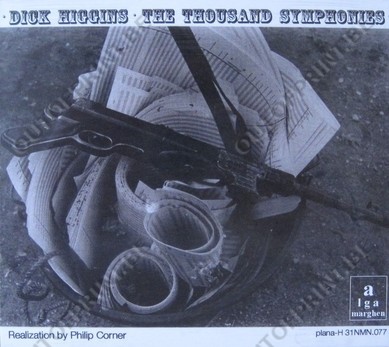
To mark the 50th anniversary of the Fluxus movement, the Graham Foundation is pleased to present The Thousand Symphonies, a seminal work by Fluxus artist Dick Higgins. In 1962, Higgins wrote a series of events called Danger Music, which were designed to alternately put the body of the performer, composer, or audience member at risk. In 1968, he realized one of these pieces by having a New Jersey police officer fire a machine gun at a few hundred sheets of orchestral music paper. An ensemble later played the holes. An act of simultaneous destruction and creation, the gesture emphasized the use of guns for a purpose other than killing Viet Cong and scattering protestors.
Recently, Dennis Rosenthal, the director of Higgins’s estate, arranged with the City of Chicago to have four Chicago Police officers shoot new notation paper. On September 18 at the Graham Foundation, a live orchestra led by Stephen Burns will play the new sheets following the presentation of a short film documenting their creation. The ensemble will borrow the form of Stravinsky's L'histoire du Soldat (The Soldier’s Tale), with instruments from every section of the orchestra, plus electric guitar, which effectively updates the orchestration.
The sheets will be packaged as an edition with the film and a recording by Dennis Rosenthal Fine Art and Galeria Moises Perez de Albeniz.
Special Thanks to the Chicago Police Department and to the Fulcrum Point New Music Project ensemble:
Stephen Burns, artistic director/conductor
Janice Misurell-Mitchell, flute
Lewis Kirk, bassoon
Jim Gailloreto, saxophone
Andy Baker, trombone
Jeff Handley, percussion
Alison Attar, harp
Steve Roberts, electric guitar
Alexander Belavsky, violin
Collins Trier, bass
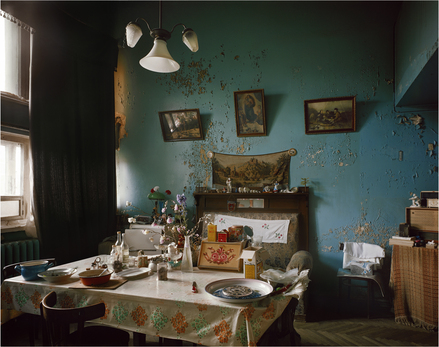
Richard Pare, Interior Narcomfin Communal House, Moisei Ginzburg and Ignati Milinis, 1930. Photograph Copyright Richard Pare 2007.
The Lost Vanguard: Soviet Modernist Architecture, 1922–32 will open with a public reception on Thursday, October 11, 2012. Please join us for a talk by British photographer Richard Pare at 5:30PM, followed by an opening reception from 6-8PM.
Richard Pare was born in England in 1948 and studied photography and graphic design in Winchester and at Ravensbourne College of Art before moving to the United States in 1971. Pare graduated from the School of the Art Institute of Chicago in 1973. He was curator of the Seagram photography collection from 1974 until 1985 and was the founding curator for the photography collection of the Canadian Centre for Architecture from its inception in 1974 until he became a consultant to the collection in 1989—a role he continues to fulfill. His works have been exhibited widely and he is represented in many of the major public collections of photography. His numerous seminal exhibitions and publications include Court House: A Photographic Document (1978), Photography and Architecture: 1839-1939 (1982), and Tadao Ando: The Colors of Light (1996), which received the AIA monograph award. Recent books include The Lost Vanguard: Architecture of the Russian Avant-garde, 1922-1932, published in 2007, and Building the Revolution, published in 2011. Pare is presently completing a new series of images on the works of Le Corbusier for the Pushkin Museum, Moscow, the first exhibition on the architect in Russia.
For more information on the exhibition, The Lost Vanguard: Soviet Modernist Architecture, 1922–32, click here.
Okkyung Lee and David Behrman will offer a free 1-hour open workshop in conjunction with their LAMPO performance on Saturday, October 27.
During the workshop, Okkyung will discuss how to develop extended instrumental techniques and Behrman will lead discussion around the idea of flexible “scores” or “deceptively simple scores,” taking a look at ways to specify conditions for a music performance, as well as the use of sensing technology and “interaction” in music. The public is invited to bring their acoustic instruments to experiment with his gear. Lampo would like to acknowledge support from New Music USA's MetLife Creative Connections program.
This workshop is presented in partnership with Lampo. Founded in 1997, Lampo is a non-profit organization for experimental music, sound art and intermedia projects.
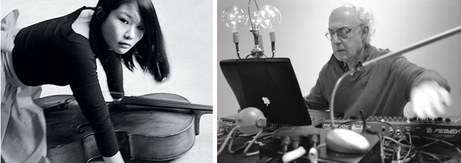
Lampo and the Graham Foundation are pleased to present David Behrman and Okkyung Lee in this performance of solo work and collaborations. Okkyung performs an extended cello improvisation, and David offers his View Finder (guitar and electronics) and Freeze Dip (violin and electronics). Together they present, Open Space with Cello / Open Space with Guitar, pieces related to Behrman’s Open Space with Brass, which was commissioned for the final performances of the Merce Cunningham Dance Company at the Armory in New York in December 2011. Their performance mixes and alternates one or several acoustic instruments with computer-enhanced and computer-generated sounds in an unfolding sequence of situations—some very free, some lightly-notated.
David Behrman (b. 1937, Salzburg, Austria) has been active as a composer and artist since the 1960s and has created performance works as well as sound installations. In 1966 he founded the Sonic Arts Union with Robert Ashley, Alvin Lucier and Gordon Mumma. Working at Columbia Records in the late 1960s, he produced the Music of Our Time series of new music recordings, which presented works by Cage, Oliveros, Lucier, Reich, Riley, Pousseur and other influential composers. He has had a long association with the Merce Cunningham Dance Company as composer and performer and has created music for several of the Company's repertory pieces. He received a D.A.A.D. fellowship in 1988-89 and an Individuals Grant from the Foundation for Contemporary Performance Arts in 1994. Behrman currently lives in New York.
Okkyung Lee (b. 1975, Daejeon,, South Korea) is a composer and cellist whose music fuses her classical training with improvisation, jazz, traditional Korean music, and noise. Lee was born and raised in Daejeon, South Korea, and attended arts schools in Seoul. In 1993 she moved to Boston, where she studied at Berklee College of Music and the New England Conservatory of Music. Since relocating to New York City in 2000, Lee has been very active in the downtown music scene, performing and recording with artists such as Laurie Anderson, Derek Bailey, Nels Cline, Shelley Hirsch, Eyvind Kang, Christian Marclay, Thurston Moore, Ikue Mori, Jim O'Rourke, Zeena Parkins, Marc Ribot, Elliott Sharp, C. Spencer Yeh, and John Zorn.
This performance is presented in partnership with Lampo. Founded in 1997, Lampo is a non-profit organization for experimental music, sound art and intermedia projects.
Please Note: Lee and Behrman will offer a free public workshop on October 26, and lead a discussion following the October 27 performance. The public is invited to bring acoustic instruments to the workshop. Funded in part through New Music USA's MetLife Creative Connections program.
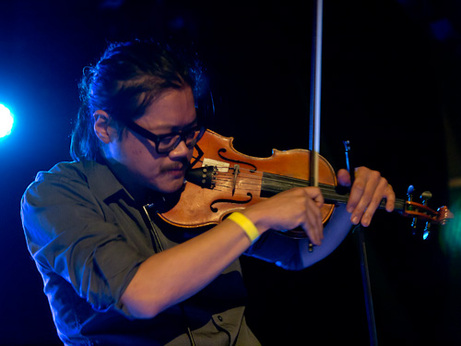
Lampo and the Graham Foundation are pleased to present Spencer Yeh in his third Lampo performance featuring new and recent videos including Baby Birds, Eclipse, Scrub Study, and a single-channel composite of the multi-channel installation, IMVIS. According to Yeh, “What I'm presenting is essentially a live performance with video acting not only as a supplement, but as a rudimentary AI [artificial intelligence]-type presence in live improvisation…In generating both pre-determined, as well as indeterminate gestures, the videos act as a ‘score’ as well as a sparring partner. The audio feed is placed on level aural ground with the musician's signal.”
Spencer Yeh (B. 1975, Taipei, Taiwan), studied film at Northwestern University, lived in Cincinnati for many years, and is now based in Brooklyn. He is recognized for the musical project Burning Star Core, as well as many other individual and collaborative activities. Current projects include The New Monuments (with Ben Hall and Don Dietrich), a yet-to-be-named quartet with Nate Wooley, Ryan Sawyer, and Colin Stetson, and ongoing collaborations with Okkyung Lee, Graham Lambkin, John Wiese, Chris Corsano, Paul Flaherty, Lasse Marhaug, Eli Keszler, and many others.
This performance is presented in partnership with Lampo. Founded in 1997, Lampo is a non-profit organization for experimental music, sound art and intermedia projects.
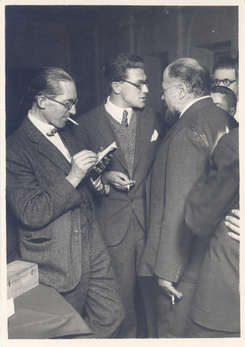
Le Corbusier, Andrei Burov, and Alexander Vesnin in Moscow in 1928, © Le Corbusier Foundation Paris.
The extraordinary explosion that reshaped Russian culture between the October 1917 revolution and the Stalinist freeze of 1930 induced extreme effects on architecture. Rationalist and constructivist designers imagined a new urban environment in which striking monumental structures conveyed the dynamics of the revolution, while several dozen edifices responded to emerging, innovative practices in the realm of housing and leisure.
In permanent contact with Western scenes such as Germany, France, and North America, albeit indirectly, the architects of the competing Avant-Garde groups saw their dreams crushed by the dire reality of rudimentary building technologies and the conservatism of the emerging ruling class. Yet this pattern of explicit, and sometimes veiled, exchange continued to characterize the production of architecture until the final victory of Modernism in the mid-1950s.
Jean-Louis Cohen was born in 1949 in Paris. Trained as an architect, he received a PhD in history. Since 1993, he has held the Sheldon H. Solow Chair for the History of Architecture at New York University's Institute of Fine Arts. His research activity focuses on twentieth-century architecture and urban design. From 1997 to 2003, he imagined and developed the Cité de l'architecture for the French Minister of Culture, a museum, research, and exhibition center that opened in 2007. In 2012, he received a Graham Foundation grant for his upcoming publication Modern Architectures in History: France (Reaktion Books). A curator of numerous exhibitions in Europe and North America, his books include Le Corbusier and the Mystique of the USSR (1992), Scenes of the World to Come (1995), Casablanca, Colonial Myths, and Architectural Ventures (2002, with Monique Eleb), Mies van der Rohe (2007), Architecture in Uniform (2011), and The Future of Architecture. Since 1889. (2012).
Modern Architectures in History: France
http://grahamfoundation.org/grantees/4817-modern-architectures-in-history-france
Architecture in Uniform: Designing and Building for the Second World War
http://grahamfoundation.org/grantees/3677-architecture-in-uniform-designing-and-building-for-the-second-world-war
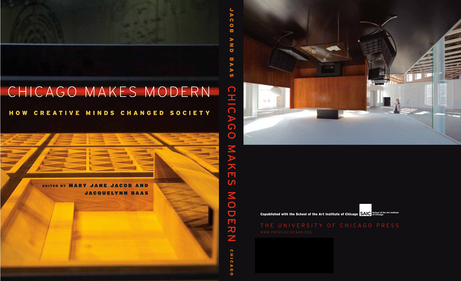
Cover of Chicago Makes Modern: How Creative Minds Changed Society, featuring Ângela Ferreira’s Crown Hall/Dragon House, 2009, as shown in the exhibition “Learning Modern” at the School of the Art Institute of Chicago’s Sullivan Galleries. Photo: Jill Frank.
From the radical social and artistic perspectives implemented by Jane Addams, John Dewey, and Buckminster Fuller to the avant-garde designs of László Moholy-Nagy and Mies van der Rohe, the prodigious offerings of Chicago's modern minds left an indelible legacy for future generations. Staging the city as a laboratory for some of our most heralded cultural experiments, Chicago Makes Modern: How Creative Minds Changed Society reimagines the modern as a space of self-realization and social progress—where individual visions triggered profound change. Featuring contributions from an acclaimed roster of contemporary artists, critics, and scholars, this book demonstrates how and why the Windy City continues to drive the modern world.
At this book launch event, contributor Ben Nicholson and artist Iñigo Manglano-Ovalle remark on their work presented in this publication, reflecting on their personal artistic and scholarly research and the continuing legacy of modernism in Chicago and beyond.The talks will be followed by a reception in the Madlener House library where signed copies of the publications will be for sale.
Ben Nicholson is associate professor in the Department of Architecture, Interior Architecture, and Designed Objects at the School of the Art Institute of Chicago. He taught at the Illinois Institute of Technology for sixteen years before joining the faculty of SAIC in 2006. He has been a visiting professor at the Southern California Institute of Architecture, the Royal Danish Academy, the University of Edinburgh, and the University of Houston. He was a fellow at the Chicago Institute for Architecture and Urbanism and has received grants from the Graham Foundation and others. His work alternates between designing homes and urban projects, digging into vernacular culture, and studying geometry and pattern. Nicholson’s earlier work focused on issues of domestic architecture, resulting in the publications Appliance House (MIT Press, 1989) and Thinking the Unthinkable House (Renaissance Society, University of Chicago, 1997). He is currently coediting a book about Frederick Kiesler and Paul Tillich titled Forms of Spirituality: Modern Architecture and Landscape in New Harmony. Nicholson is also creating micro-infrastructural projects in the utopian town of New Harmony, Indiana, where he lives.
Iñigo Manglano-Ovalle (b. 1961, Madrid, Spain) received a B.A. from Williams College in Williamstown, MA, and an M.F.A. from The School of The Art Institute of Chicago. His noted film trilogy Le Baiser/The Kiss (1999), Climate (2000), and In Ordinary Time (2001) focuses on the architecture of Mies van der Rohe and the implications of Modernism. Solo exhibitions include: The Art Institute of Chicago; The Krefeld Suite, Museum Haus Esters and Haus Lange, Krefend, Germany; El Museo de Arte Contemporáneo de Monterrey and Museo Tamayo Arte Contemporaneo, Mexico City; Barcelona Pavilion, Fundación Mies van der Rohe, Barcelona, Spain; and Museum of Contemporary Art, Chicago, among others. Group exhibitions include: Bienal de São Paulo, São Paulo, Brazil; InSITE, San Diego; Tempo, Museum of Modern Art, New York; Moving Pictures, Solomon R. Guggenheim Museum, New York and Guggenheim Museum, Bilbao, Spain; The Whitney Biennial, Whitney Museum of American Art, New York; Liverpool Biennial, Liverpool, England, and Documenta 12, Kassel, Germany. He has received a National Endowment for the Arts fellowship, the Media Arts Award from the Wexner Center for the Arts, the John D. and Catherine T. MacArthur Foundation Fellowship, and a John Simon Guggenheim Foundation Fellowship.
Chicago Makes Modern was supported by a grant from the Graham Foundation in 2010. The book is a co-publication of the School of the Art Institute of Chicago and the University of Chicago Press, with special thanks to the Mies van der Rohe Society at the Illinois Institute of Technology, and the Loyola University Museum of Art. This launch event is also made possible by the Consulate General of Switzerland.
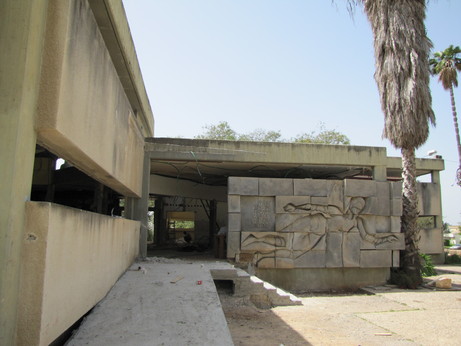
Semi-demolished dinning hall at Yad Hanna. (Photo: Yuval Yasky, 2010
Yuval Yasky, head of the architecture department at the Bezalel Academy of Art and Design in Jerusalem, will speak about his ongoing research on the Kibbutz movement in Israel. The lecture will present the evolution of the Kibbutz from its early days and the current struggle to preserve its unique qualities amidst processes of change and privatization.
Yuval Yasky (b. 1970, Tel Aviv, Israel) is a practicing architect based in Tel Aviv. He studied Philosophy and Art History at Tel Aviv University and Architecture at the Southern California Institute of Architecture. He has taught at the Technion in Haifa and Bezalel Academy of Art and Design in Jerusalem where he is the head of the Architecture Department. He was the curator of numerous exhibitions among them - the Israeli pavilion at the 12th Venice Architecture Biennale titled Kibbutz: An Architecture without Precedents (2010), Kibbutz and Bauhaus – Pioneers of the Collective (the Bauhaus Foundation, Dessau, 2011), Architecture for the Community (Urban Center, Milan, 2011).
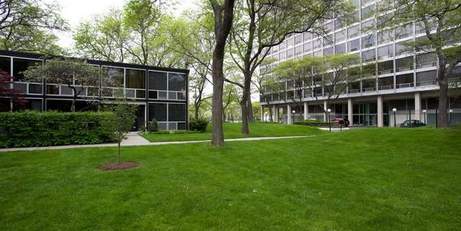
Many architectural publications glorify iconic architecture through photographs of buildings taken from the outside or through images of sparsely furnished interiors devoid of people. Thanks for the View, Mr. Mies shows life in Lafayette Park—a collection of residential buildings designed by Mies van der Rohe in downtown Detroit—from the inside out and documents the point of view of its homeowners, tenants, and staff.
Graphic designers and co-editors, Danielle Aubert and Natasha Chandani, will speak about the new book, and contributor Noah Resnick will talk about the design and operation of the buildings’ grounds, designed by landscape architect Alfred Caldwell, from his perspective as a Lafayette Park resident.
Danielle Aubert is a professor of graphic design at Wayne State University in Detroit. In 2008 she collaborated with Lana Cavar on the design for the book ReFusing Fashion: Rei Kawakubo for the Museum of Contemporary Art Detroit. More recently, she collaborated with Dutch designers Mevis and van Deursen on MEC (Steidl Press, 2010) about the work of artist Mary Ellen Carroll. Her work has appeared in various exhibitions and design publications, including Wired and Metropolis magazines. Her book 16 Months Worth of Drawing Exercises in Microsoft Excel was published in 2006 by Various Projects. Danielle holds a BA in English Literature from the University of Virginia and an MFA in graphic design from Yale University.
Natasha Chandani is based in New York City. She has worked on a number of publications with clients in the United States, the Netherlands, the UK and India. For several years she worked as a designer for the architecture publication Volume. She collaborated with Dutch designer Irma Boom on the design of Al Manakh (with editors Rem Koolhaas, Ole Bouman and Mark Wigley), a study of the current condition of the Gulf for the International Design Forum in Dubai, 2007. She most recently worked on American Craft magazine.
Noah Resnick currently teaches and practices in Detroit. He is the director of graduate architecture at the University of Detroit Mercy and a founding principal of uRbanDetail, an intimate research-based architecture and urban design studio that operates under the interrelated concepts of the architectonics of multiple scales; the architect as urban collaborator; and the architect as community builder. Noah earned his BArch from the Illinois Institute of Technology in Chicago and completed his Masters of Science in Architecture Studies at the Massachusetts Institute of Technology.
Thanks for the View, Mr. Mies is co-edited by Danielle Aubert, Lana Cavar, Natasha Chandani and published by Metropolis Books, 2012.
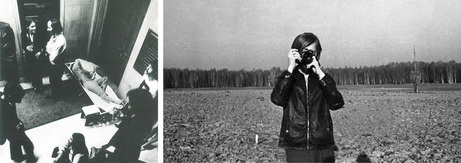
David Getsy and Yelena Kalinsky will present a pair of illustrated talks on the documentation of performance, particularly as it relates to temporality, participation and memory in the late '60s/early '70s performance work of artist Scott Burton and the ongoing work of Russian conceptual performance group, Collective Actions. This event is a celebration of Getsy's and Kalinsky's respective publications, Scott Burton: Collected Writings on Art and Performance, 1965-1975 and Collective Actions: Audience Recollections from the First Five Years, 1976-1981, both of which were recently published by Chicago-based Soberscove Press. The talks will be followed by a reception in the Madlener House library where signed copies of the publications will be for sale.
David J. Getsy is the Goldabelle McComb Finn Distinguished Professor of Art History at the School of the Art Institute of Chicago. Educated at Oberlin College and holding a Ph.D. from Northwestern University, he has been the recipient of fellowships from the Center for Advanced Study in the Visual Arts, the Getty Foundation, the Kress Foundation, and Dartmouth College. His books include Rodin: Sex and the Making of Modern Sculpture (Yale University Press, 2010) and Body Doubles: Sculpture in Britain, 1877–1905 (Yale University Press, 2004) as well as the edited anthologies From Diversion to Subversion: Games, Play, and Twentieth-Century Art (Penn State University Press, 2011) and Sculpture and the Pursuit of a Modern Ideal in Britain, c.1880-1930 (Ashgate, 2004). His research focuses on the history and theory of modern and contemporary art, with an emphasis on histories of sculpture and performance.
Yelena Kalinsky is an art historian whose dissertation, Collective Actions: Moscow Conceptualism, Performance, and the Archive, 1976-1989, offers an in-depth art historical treatment of Collective Actions in English. Her translations of Collective Actions' documentary and theoretical writings can be found on-line at conceptualism.letov.ru. Yalinsky was a Fulbright Fellow in Russia and curated Performing the Archive: Collective Actions in the 1970s & 1980s (2008-09) at the Zimmerli Art Museum at Rutgers University, where she also did her doctoral work.
Soberscove Press is a Chicago-based press that publishes art-related material, including artists' books, out-of-print transcripts, and artists' writings.
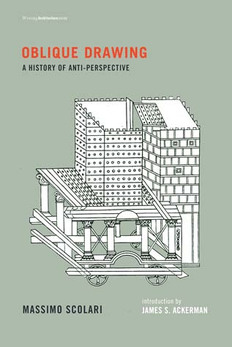
Oblique Drawing: A History of Anti-Perspective Massimo Scolari. For more on this graham funded project, see: grahamfoundation.org/grantees/4885-on-drawing-and-architecture-massimo-scolari-the-representation-of-architecture-1967-2012
Please join us for our annual holiday gathering and book sale. All books will be discounted at least 10%, with some titles up to 35%. The Graham bookshop is a perfect place to round out your holiday shopping with new and classic architecture titles from monographs to history and theory.
Unless otherwise noted,
all events take place at:
Madlener House4 West Burton Place, Chicago
GALLERY AND BOOKSHOP HOURS
2025 Chicago Architecture Biennial
SHIFT: Architecture in Times of Radical Change
Sep 19, 2025–Feb 28, 2026
Wed–Sat, 12–5 p.m.
CONTACT
312.787.4071
info@grahamfoundation.org
Accessibility
Events are held in the ballroom on the third floor which is only accessible by stairs.The first floor of the Madlener House is accessible via an outdoor lift. Please call 312.787.4071 to make arrangements.
Copyright © 2008–2026 Graham Foundation. All rights reserved.